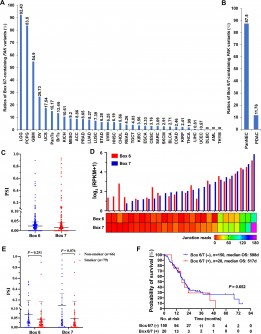Health
Study Reveals Key Genetic Variants in Neuroendocrine Tumors

Research from the **Chinese Academy of Medical Sciences** and **Peking Union Medical College** has unveiled significant findings regarding the oncogene **Focal Adhesion Kinase (FAK)** in neuroendocrine tumors (NENs) of the pancreas and breast. The study, published in the journal **Frontiers of Medicine**, highlights the prevalence of specific splicing variants of FAK, providing insights that could lead to new biomarkers and therapeutic targets for these challenging tumors.
The researchers analyzed data from **The Cancer Genome Atlas**, which includes information from **9,193 patients across 33 different cancer subtypes**. Their findings indicate that splicing variants containing **Box 6/Box 7** of FAK, referred to as **FAK 6/7**, occur in a majority of pancreatic neuroendocrine carcinomas. Specifically, **87.5%** of the **8 tested pancreatic neuroendocrine carcinomas** exhibited the FAK 6/7 variant, compared to **11.76%** of **170 pancreatic ductal adenocarcinomas (PDACs)**.
In further testing involving **157 tumor samples** from Chinese patients diagnosed with pancreatic tumors, the researchers found that **FAK 6/7** was present in **75.6%** of **45 pancreatic NENs** and **47.5%** of **40 pancreatic solid pseudopapillary neoplasms**. In stark contrast, this variant was found in only **2.9%** of **69 PDACs**.
The study also extended its analysis to breast neuroendocrine carcinoma (BrNECs), where **FAK 6/7** was identified in **93.3%** of **15 BrNECs** but absent in **all 23 non-NEC breast cancer samples** tested. This striking difference underscores the potential of FAK 6/7 as a specific biomarker for neuroendocrine tumors.
The researchers explored the mechanisms underlying these findings and identified an overexpression of a splicing factor known as **serine/arginine repetitive matrix protein 4 (SRRM4)** in FAK 6/7-positive tumors. This overexpression appears to facilitate the production of the FAK 6/7 variant in both pancreatic and breast tumors, indicating a possible pathway for further investigation.
Given these insights, the authors suggest that **FAK 6/7** could serve not only as a biomarker for NENs but also represent a promising therapeutic target for these often-overlooked diseases. The study received funding from multiple prestigious sources, including the **Key Project of the National Natural Science Foundation of China** and the **National Key Research and Development Program of China**.
For those interested in the comprehensive findings, the full study is available in **Volume 17, Issue 5** of **Frontiers of Medicine**. The research opens avenues for future studies aimed at targeting FAK variants in clinical settings, potentially improving outcomes for patients with neuroendocrine tumors.
-

 Technology4 months ago
Technology4 months agoDiscover the Top 10 Calorie Counting Apps of 2025
-

 Health2 months ago
Health2 months agoBella Hadid Shares Health Update After Treatment for Lyme Disease
-

 Health3 months ago
Health3 months agoErin Bates Shares Recovery Update Following Sepsis Complications
-

 Technology3 weeks ago
Technology3 weeks agoDiscover 2025’s Top GPUs for Exceptional 4K Gaming Performance
-

 Technology2 months ago
Technology2 months agoElectric Moto Influencer Surronster Arrested in Tijuana
-

 Technology4 months ago
Technology4 months agoDiscover How to Reverse Image Search Using ChatGPT Effortlessly
-

 Technology4 months ago
Technology4 months agoMeta Initiates $60B AI Data Center Expansion, Starting in Ohio
-

 Technology4 months ago
Technology4 months agoRecovering a Suspended TikTok Account: A Step-by-Step Guide
-

 Health4 months ago
Health4 months agoTested: Rab Firewall Mountain Jacket Survives Harsh Conditions
-

 Lifestyle4 months ago
Lifestyle4 months agoBelton Family Reunites After Daughter Survives Hill Country Floods
-

 Technology3 months ago
Technology3 months agoUncovering the Top Five Most Challenging Motorcycles to Ride
-

 Technology4 weeks ago
Technology4 weeks agoDiscover the Best Wireless Earbuds for Every Lifestyle









